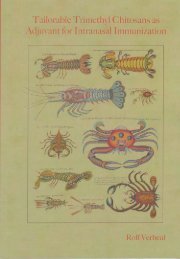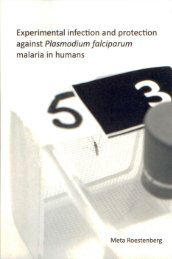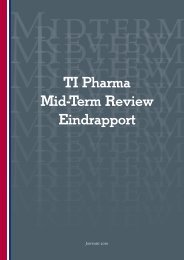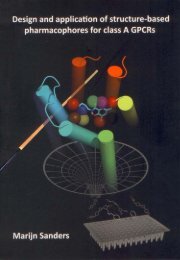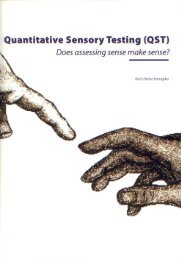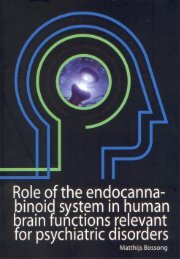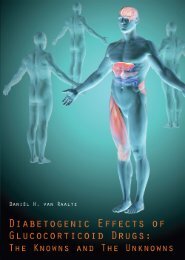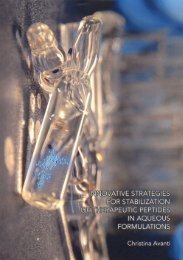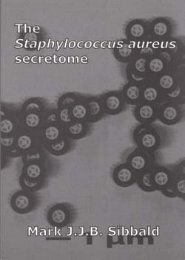The vagus nerve as a modulator of intestinal inflammation - TI Pharma
The vagus nerve as a modulator of intestinal inflammation - TI Pharma
The vagus nerve as a modulator of intestinal inflammation - TI Pharma
You also want an ePaper? Increase the reach of your titles
YUMPU automatically turns print PDFs into web optimized ePapers that Google loves.
Summary and conclusions<br />
exposure could affect expression <strong>of</strong> nAChRα7, dupα7 or β2 on human monocytes.<br />
We demonstrated that repeated nicotine exposure up-regulated nAChRα7 expression<br />
in a human monocyte cell line. In conjunction, in a pilot study, nAChRα7 w<strong>as</strong> only<br />
detectable in monocytes <strong>of</strong> smoking individuals. nAChR dupα7 w<strong>as</strong> ubiquitously<br />
expressed on human monocytes, while nAChRβ2 w<strong>as</strong> not detectable. However, the<br />
nitotine induced up-regulation <strong>of</strong> nAChR α7 in human monocytes did not render cells<br />
more susceptible to cholinergic immune-modulation, either via nicotine application<br />
or via administration <strong>of</strong> olive oil.<br />
<strong>The</strong> Summarizing Figure is a model <strong>of</strong> the mechanism via which <strong>vagus</strong> <strong>nerve</strong><br />
activity modulates <strong>intestinal</strong> macrophage function, according to the results obtained<br />
in this thesis.<br />
<strong>The</strong>rapeutic options and future perspectives<br />
Results obtained in a wide range <strong>of</strong> in vitro and in vivo models <strong>of</strong> <strong>inflammation</strong><br />
imply that therapeutic agents targeting the ‘cholinergic anti-inflammatory pathway’<br />
can be an important <strong>as</strong>set in the treatment <strong>of</strong> immune disorders in human. In vivo,<br />
cholinergic activation can be accomplished in several ways. <strong>The</strong> best known, although<br />
not the most selective way, is by cigarette smoking.<br />
In inflammatory bowel dise<strong>as</strong>e, cigarette smoking is an important environmental<br />
factor, but h<strong>as</strong> differential effects in ulcerative colitis (UC) and Crohn’s dise<strong>as</strong>e (CD).<br />
While smoking incre<strong>as</strong>es the risk <strong>of</strong> developing CD, it appears to have a protective<br />
effect in the development <strong>of</strong> UC and reduces its severity25 . However, clinical trials<br />
using nicotine for the treatment <strong>of</strong> UC have showed no significant advantage for<br />
transdermal nicotine therapy compared to standard therapy, while nicotine did show<br />
more side effects22 . <strong>The</strong>refore, the challenge is to define a specific nAChR agonist with<br />
highest anti-inflammatory potential and le<strong>as</strong>t side effects. Partial selective nAChR α7<br />
and α4β2 agonists are already being tested in patients with neuronal disorders, since<br />
both receptor subtypes have shown to mediate improvement in attention, learning<br />
and working memory26 . <strong>The</strong> most characterized nAChR-agonist is GTS-21, a partial<br />
α7 nAChR agonist that also affects α4β2 nAChR27 , is well tolerated humans. In vitro,<br />
this agonist h<strong>as</strong> shown to diminish production <strong>of</strong> pro-inflammatory mediators in<br />
mouse and human immune cells28,29 . In a recent study on the effects <strong>of</strong> GTS-21 on<br />
the innate response during human endotoxemia in 14 non-smoking individuals, there<br />
were no differences in the LPS-induced cytokine response between the GTS-21 and<br />
placebo-treated groups30 .<br />
Targeting the nAChRs using specific agonists, requires exact knowledge <strong>of</strong><br />
which nAChR is involved in the anti-inflammatory effects <strong>of</strong> cholinergic activation.<br />
<strong>The</strong>se effects have previously been only attributed to activation <strong>of</strong> the nAChR α79.<br />
Nevertheless, nAChRα7 w<strong>as</strong> not present on monocytes <strong>of</strong> non-smoking individuals<br />
(chapter 7), in conjunction we failed to detect α7 nAChR transcripts in certain mouse<br />
137



